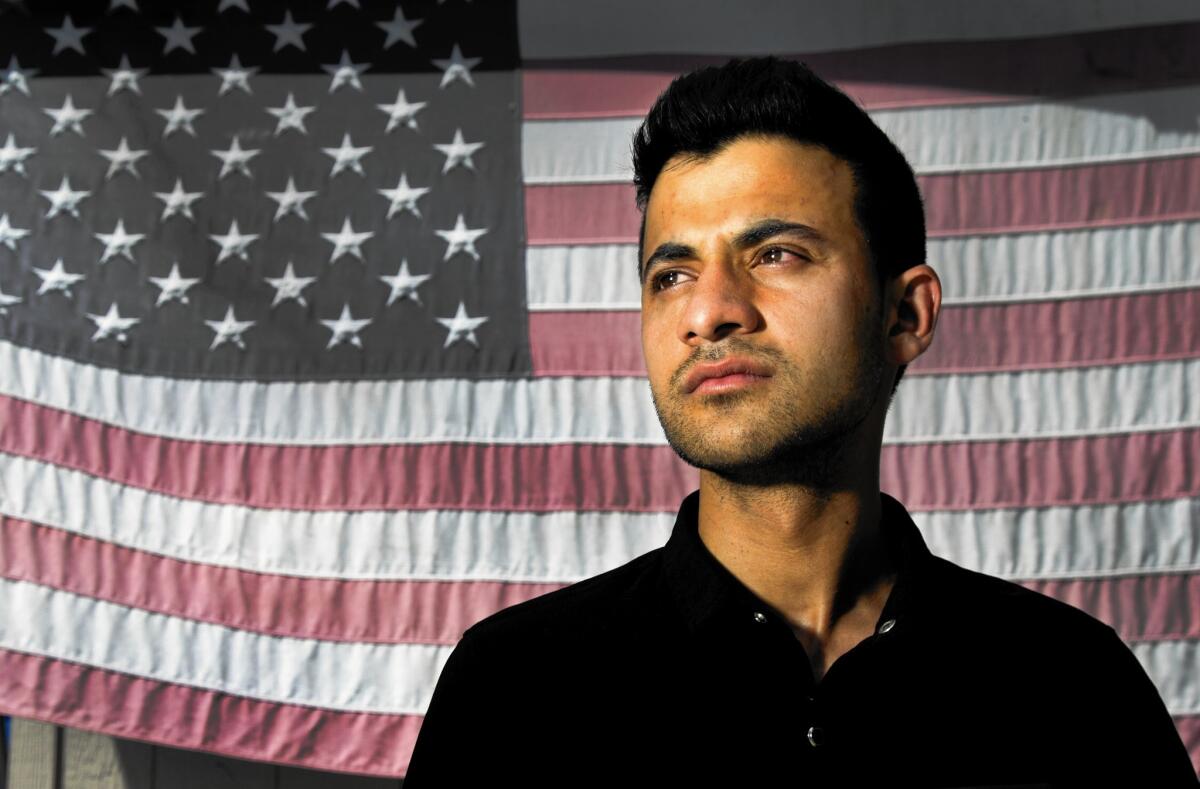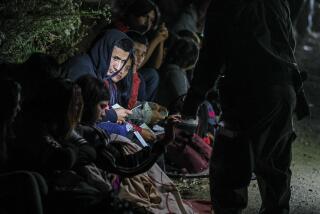Afghan and Iraqi battlefield interpreters begin anew under U.S. visa program

His name is âJack.â
In Afghanistan, he grew up tending cows and a goat on family land far from the provincial capital of Kandahar.
Jack learned English so that he could work with U.S. troops âbecause they are helping us,â he recently said via email.
On Thursday, he arrived in San Diego to start his new life as a refugee.
The 23-year-old Afghan native is one of nearly 30,000 foreign nationals who since 2007 have successfully parlayed working for the United States in Iraq or Afghanistan into a new American existence.
But it hasnât been an easy or certain road.
The special visa program for this group of immigrants, 70% of whom worked as translators and interpreters for U.S. troops, has been criticized as being too cumbersome and taking too long to bring over qualified applicants.
Although American soldiers are largely gone from Iraq and Afghanistan, many of the locals who stood with them are still there â and in danger, advocates say.
Matt Zeller was a 26-year-old Army first lieutenant when his interpreter, Janis Shinwari, saved his life in Afghanistan in 2008.
âJanis literally shot and killed two Taliban fighters who were about to kill me. After that, I made him the solemn promise if I could ever repay that debt, I would,â said Zeller, a former Army intelligence officer and one-time congressional candidate.
It took three years for Shinwari to get his visa. And when the interpreter and his family finally landed at Washingtonâs Reagan National Airport in 2013, they were entering an iPhone culture while hailing from a country where many donât have email access.
After that, Zeller and Shinwari decided to help others navigate the system.
In late 2013, they formed the charity No One Left Behind. The group has assisted 500 former interpreters and their families with resettlement.
Zeller said the need for the charityâs support is high. More than 14,000 people are competing for the 2,500 special visas still available to Afghan interpreters, he said.
In 2006, Congress first acted to approve special visas for Afghans and Iraqis who helped the United States. The criteria required at least a year of service and being able to pass a security test.
In the following years, Congress increased the number of visas available, but critics said the application process was unnecessarily difficult and often resulted in paperwork bottlenecks.
In response to media scrutiny and lobbying by advocates including Zeller, Congress has further increased the number of visas, and the State Department has streamlined the process somewhat â although the average processing time for an Afghan application is still 13 months.
Security clearances are the biggest roadblock. Although interpreters have in theory already proved their allegiance, vigilance remains high.
The situation was not helped by the 2011 arrest of two Iraqi refugees in the U.S. on charges of terrorism. Then an Iraqi immigrant who may have served as an interpreter was arrested in Texas last May on suspicion of lying to the FBI about swearing allegiance to the militant group Islamic State, according to news reports.
But people who have worked with interpreters see them as brothers in arms.
Robin Kimmelman was a U.S. legal advisor to the Afghan National Army from 2012 to 2014. Jack was her interpreter.
âI could not have done my job without him, and he definitely kept me safe while I was there,â said Kimmelman, who helped the Afghan man wade through the visa process for more than two years. âI wanted to make sure we took care of him and got him to safety.â
Jack is No One Left Behindâs first transplant to San Diego County. Zeller said the group hopes to create a hub in this region because of its large population of post-9/11 veterans.
A 51-year-old Iraqi immigrant who goes by âJohnny Walkerâ already knows the road that Jack faces.
When you arrive at Walkerâs small house in eastern San Diego County, thereâs a U.S. flag hanging out front, accompanied by a Navy SEAL banner.
Walker, wearing dark sunglasses and drinking a Coors Light, is a tall man with military-cropped hair.
On his patio are the signposts of his distinctive history: Thereâs a hookah pipe for smoking pungent Middle Eastern tobacco and a shiny American barbecue grill.
A native of Mosul, Iraq, he arrived in the United States in 2009 after working as an interpreter for Navy SEALs, who gave him his nickname.
He claims to have performed as many as 1,000 missions during five years as a SEAL interpreter. (You can read about it in his 2014 biography, âCode Name: Johnny Walker.â)
After the war ended, he wanted to remain in Iraq and continue fighting for his country. But it meant his family would stay on the run and in danger.
âI thought, âIf Iâm leaving Iraq, who will stay in Iraq and fight for Iraqi freedom?ââ he said in a recent interview.
The situation became unbearable when he traveled from Baghdad to Mosul to visit his family.
âWhen I had a vacation, donât think I was taking my family to Disneyland or Vegas â no.â Walker said. âI would just stay in my room and stand by with my AK-47 or grenade. If somebody attacked my house, I can protect my family. It was kind of torturing, and I have no option.â
In the United States, the first thing he did was go to Target to buy an American-style shirt.
Walker was lucky. His Navy SEAL buddies stood by him, securing him an on-base job and a hand-me-down car.
The Iraqi will now try to do the same for Jack, who will stay with Walker and his family until he gets acclimated.
In general, refugees â Afghan and Iraqi interpreters fall into this category â receive a modest financial welcome from the U.S. government.
In San Diego, they can receive a $1,125 initial stipend to get settled, according to people familiar with the process. Afterward, single adults and couples without children are eligible for up to eight months of cash assistance, food stamps and Medi-Cal coverage. The cash benefit is $350 for singles and $569 for couples.
Families with children can get more assistance over a longer period.
No One Left Behind offers its recipients more, including home furnishings and three months of living expenses.
Zeller said he has seen former interpreters obtain work as landscapers, car salesmen, gas station attendants and retail clerks. If they can get a vehicle, they may use a pizza delivery job to finance a nicer car and then work as a driver for ride-sharing services such as Uber and Lyft.
After Jack settles in, he says, he wants to join the U.S. military.
On Friday, he was still getting used to his new American home.
âI was thinking I was dreaming. Itâs like watching a movie,â he said about his first impressions of Southern California. âI feel very safe. Even last night, I slept very well.â
Jeanette Steele writes for the San Diego Union-Tribune.
More to Read
Sign up for Essential California
The most important California stories and recommendations in your inbox every morning.
You may occasionally receive promotional content from the Los Angeles Times.










![[20060326 (LA/A20) -- STATING THE CASE: Marchers organized by unions, religious organizations and immigrants rights groups carry signs and chant in downtown L.A. "People are really upset that all the work they do, everything that they give to this nation, is ignored," said Angelica Salas of the Coalition of Humane Immigrant Rights. -- PHOTOGRAPHER: Photographs by Gina Ferazzi The Los Angeles Times] *** [Ferazzi, Gina -- - 109170.ME.0325.rights.12.GMF- Gina Ferazzi/Los Angeles Times - Thousands of protesters march to city hall in downtown Los Angeles Saturday, March 25, 2006. They are protesting against House-passed HR 4437, an anti-immigration bill that opponents say will criminalize millions of immigrant families and anyone who comes into contact with them.]](https://ca-times.brightspotcdn.com/dims4/default/34f403d/2147483647/strip/true/crop/1983x1322+109+0/resize/840x560!/quality/75/?url=https%3A%2F%2Fcalifornia-times-brightspot.s3.amazonaws.com%2Fzbk%2Fdamlat_images%2FLA%2FLA_PHOTO_ARCHIVE%2FSDOCS%2854%29%2Fkx3lslnc.JPG)